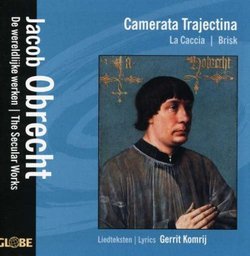| All Artists: Jacob Obrecht, Heinrich Isaac, Camerata Trajectina, La Caccia, Marcel Beekman Title: Jacob Obrecht: The Secular Works Members Wishing: 1 Total Copies: 0 Label: Globe Original Release Date: 1/1/2005 Re-Release Date: 12/27/2005 Album Type: Import Genres: Pop, Classical Styles: Vocal Pop, Chamber Music, Historical Periods, Classical (c.1770-1830) Number of Discs: 1 SwapaCD Credits: 1 UPC: 8711525605909 |
Search - Jacob Obrecht, Heinrich Isaac, Camerata Trajectina :: Jacob Obrecht: The Secular Works
 | Jacob Obrecht, Heinrich Isaac, Camerata Trajectina Jacob Obrecht: The Secular Works Genres: Pop, Classical
|
Larger Image |
CD Details |
CD ReviewsGet It Any Way You Can! Giordano Bruno | Wherever I am, I am. | 01/13/2010 (5 out of 5 stars) "Go shopping elsewhere! As a last resort, buy the MP3 download, for this is the craftiest and most exciting performance of Renaissance secular music you're ever likely to hear. There are two simple reasons: the quality of the performance and the quality of the music itself. Camerata Trajectina is a Dutch ensemble that has consistently specialized in the music of Holland's "Golden Age". They know the repertoire better than anyone, and they have the 'historically informed' skills to perform it with conviction. The ensemble includes voices, bowed and plucked strings, and some very capable wind players -- shawms, trombones (sacquebouches, sackbutts), and recorders. They also have a deft way of assembling these too-brief gems into a smoothly flowing concert program.
Jacob Obrecht (1457-1505) was the scion of a family of trumpeters in the Burgundian city of Ghent. Don't suppose that being a trumpeter was a servile occupation! The six official trumpeters of Ghent, one of whom was Obrecht's father Willem, were well paid -- shall we say as well as the conductors of major symphonies today -- well traveled, well connected, and well off. As a child, Jacob had a secure inheritance of roughly six times the wages of a wool-worker annually. He could have lived in leisure, but it would have been normal for him to succeed his father in the prestigious Guild of Trumpeters, for which he was certainly given training. Instead he attended a university, possibly in Naples, where he earned a "master" diploma. In other words, he had an elite education. At the age of 21 or 22, he was ordained as a priest; this must have required a special dispensation for such a young man, and the supposition was that he would pursue a career of prestige in the administration of the Church. Surprisingly, he didn't! Instead he chose the risky course of becoming a freelance singer and composer. Or perhaps the Muse chose him; by his early twenties, Obrecht was already becoming famous as a composer, mentioned in the same treatises and documents as Ockeghem and Busnois. Obrecht's seminal role in the development of what we call Franco-Flemish polyphony has been stupidly overshadowed by the later fame of his younger contemporary Josquin des Prez. A scholarly look at Obrecht's masses and motets reveals that inspired innovation flowed chiefly from Obrecht to Josquin rather than vice versa. Neither man, of course, is on hand to argue about precedence today, but Obrecht's music deserves far more attention than it has received. There are several excellent performances of his masses on CDs, by the ensembles 'Cappella Pratensis', 'The Tallis Scholars', and 'The Clerks' Group'. Naturally Obrecht's compositions of sacred vocal music were the apex of his art, but he was also a prolific composer of secular pieces -- chansons in several languages as well as instrumental fantasies. His childhood training as an instrumentalist blended seamlessly with his elite training as a churchly polyphonist. No other composer of secular music could match his sophistication, especially in the flashy idiom of instrumental 'improvisation'. What Obrecht wrote down on his musical scores must obviously represent what the most virtuosic wind players of his era performed for an eager public. These little pieces have wit and zest, and all the complexity of Obrecht's masses in miniature. What an amazing thing it is, that such an 'immortal genius' as Jacob Obrecht -- for so he was acclaimed by his contemporaries -- could have been utterly forgotten for 500 years! And what an even more amazing thing it is that, in this crass and foolhardy epoch of ours, his music could be rediscovered and performed with such mastery!" |

 Track Listings (28) - Disc #1
Track Listings (28) - Disc #1